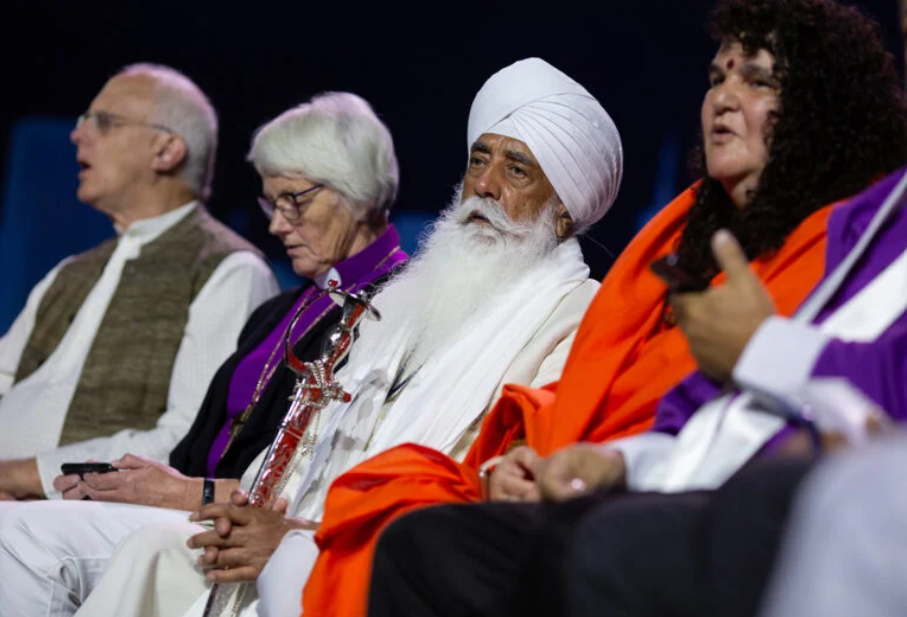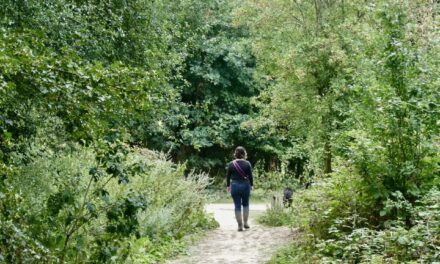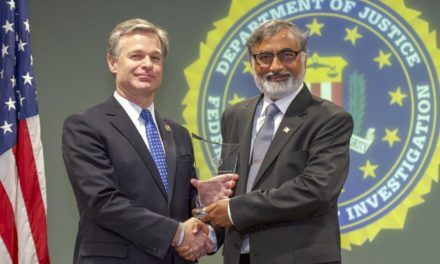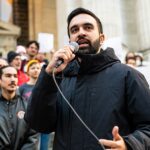Bhai Mohinder Singh, center, and other religious leaders chant on stage during a climate repentance ceremony at the Parliament of the World’s Religions in Chicago on Aug. 15, 2023. Photo by Lauren Pond for RNS
CHICAGO (RNS) — Dealing with the climate crisis will require developing renewable forms of energy such as solar and wind power, decreasing greenhouse gases and creating more sustainable lifestyles.
It also requires a change of heart, says Swami Rameshwarananda, a Hindu spiritual leader from Spain.
While many people know that immediate action needs to be taken to address rising global temperatures, said Rameshwarananda, most of us would rather protect the comfortable life we have than make needed changes.
“We have to exchange the concept of ego for the concept of ‘eco,’” he said. “Ego is the problem.”
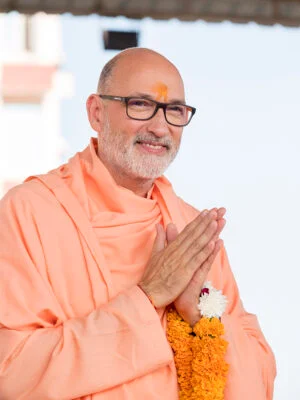
Swami Rameshwarananda in India in 2018. Photo by Marcos Soria/Fundación Phi/Wikimedia/Creative Commons
Rameshwarananda is one of approximately 50 faith leaders who drafted a set of 10 spiritual principles for addressing the climate crisis. Those principles urge repenting for failing to care for the Earth and pledging to do better in the future. They were unveiled last fall in “climate repentance” ceremonies held both in Egypt and London in time to coincide with the U.N. climate change conference in Egypt.
A similar ceremony was held this week at the Parliament of the World’s Religions, which drew 6,000 leaders from more than 200 spiritual traditions to Chicago.
Imam Feisal Abdul Rauf, president and founder of Cordoba House, said the faith leaders who drafted the principles — most affiliated with the Elijah Board of World Religious Leaders — had originally hoped to unveil the principles on Mount Sinai in Egypt, where Moses receives the Ten Commandments in the Bible.
“When that became problematic, we relocated to London and walked up Parliament Hill instead,” said Abdul Rauf in an interview with leaders before the climate repentance ceremony Tuesday (Aug. 15) at Chicago’s McCormick Center.
Abdul Rauf and Rameshwarananda joined a group of Muslim, Hindu, Jewish, Sikh, Jain, Buddhist and Christian leaders from around the world who recited the 10 principles during the repentance ceremony, after an introduction by Rabbi Alon Goshen-Gottstein.
“We know what we need to do, but we lack the will,” Goshen-Gottstein told Parliament attendees gathered in a cavernous main hall. “The will is generated by spirituality. And so, by turning to the common resources of our religions, we awaken the will to do the right thing.”
The principles begin by stating: “Creation is not our possession. The human person must recognize this and find his/her rightful place in relationship to this fundamental fact.”
Later principles called for listeners to treat the planet and all life on it with reverence and to care for one another.
“Within creation, and between humans and other parts of creation, as well as religious communities, there is interdependence,” read Swamini Adityananda Saraswati. “All are part of a greater whole wherein each element both receives and gives influence, impact, love and growth. Therefore: We must care for each other and the planet.”
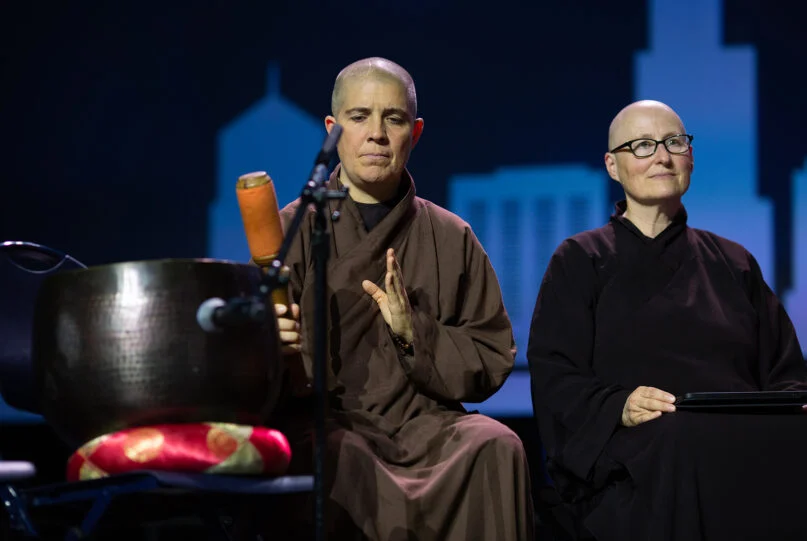
“When that became problematic, we relocated to London and walked up Parliament Hill instead,” said Abdul Rauf in an interview with leaders before the climate repentance ceremony Tuesday (Aug. 15) at Chicago’s McCormick Center.
After the reading of the principles, Buddhist nuns rang a bell and Goshen-Gottstein blew on a shofar, a Jewish instrument made from a ram’s horn. The rabbi then led attendees through a set of Jewish prayers based on the words of youthful climate activist Greta Thunberg.
“The world is waking up,” chanted Goshen-Gottstein. “And change is coming whether you like it or not.”
At the end of each line of the prayer, attendees sang the Hebrew word “Hoshana,” which Goshen-Gottstein said translates as “save us.”
Then came prayers from a former Lutheran bishop from Sweden and a Sikh leader, followed by a set of Buddhist meditations on repentance and the climate crisis titled “Beginning again with the Earth.”
“We, your children, with our hearts at peace and pure, join our palms and turn respectful to you, our loving and patient Mother Earth, as we offer words of repentance,” the liturgy began, each line followed by the sounding of a bell.
After the Buddhist liturgy, Bishop Ray Rivera, a Hispanic Pentecostal leader from New York, recited The Canticle for Creation, a famed prayer by St. Francis.
“Be praised, my Lord, for all your creation and especially for our Brother Sun,
who brings us the day and the light. He is strong and shines magnificently.
O Lord, we think of you when we look at him,” Rivera read. “Be praised, my Lord, for Sister Moon, and for the stars which you have set shining and lovely in the heavens.”
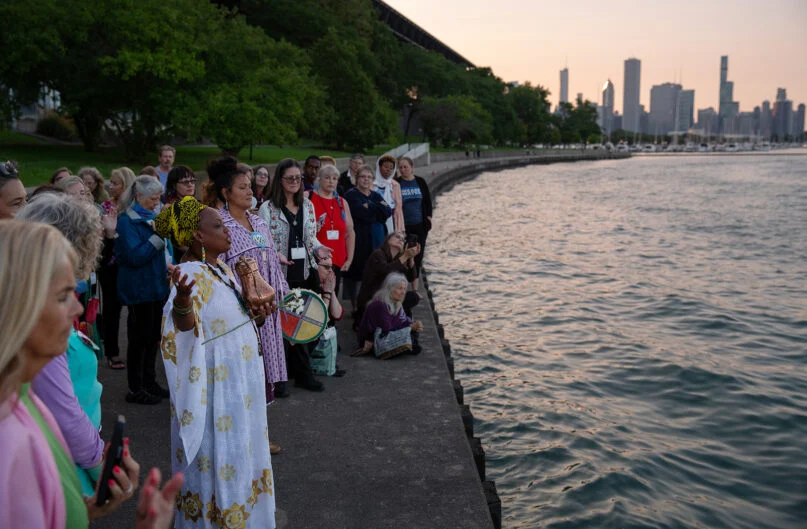
Yoruba priestess Aina-Nia leads a water ceremony by Lake Michigan as part of the Parliament of the World’s Religions in Chicago on Aug. 15, 2023. During the ceremony, which recognized the sacredness of water, water from different parts of the world was combined and poured into the lake. Photo by Lauren Pond for RNS
In an interview before the ceremony, Rivera said that many religious people tend to separate what he called the “spiritual and the social,” believing religion has little to say about real-world problems. When it comes to the environment, he said, people are more comfortable with small steps like recycling rather than addressing issues such as climate change.
“We have to do individual conservation–recycling and all of that,” he said. “But that’s not ultimately the answer. Climate justice is systemic; there are things wrong with the system. And we as the faith community have to speak truth to power, and confront those systems that are perpetuating a lot of climate disaster in the world.”
Many of the faith leaders who took part in the climate repentance ceremony said they are hopeful things can change. But nothing will happen without intentional action.
Rameshwarananda said he is concerned that too many people believe catastrophic climate change is coming but think nothing can be done about it.
“Everyone accepts now the apocalypse,” he said. “No, it will not happen if we do what is needed.”
